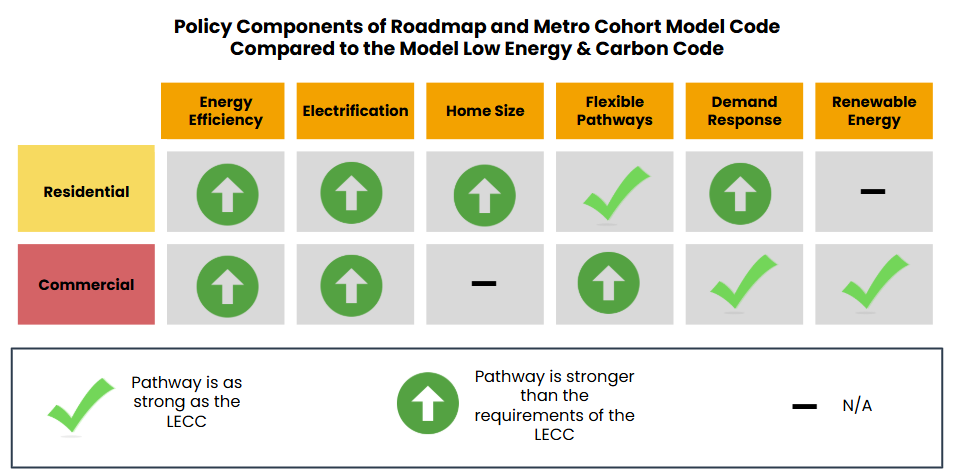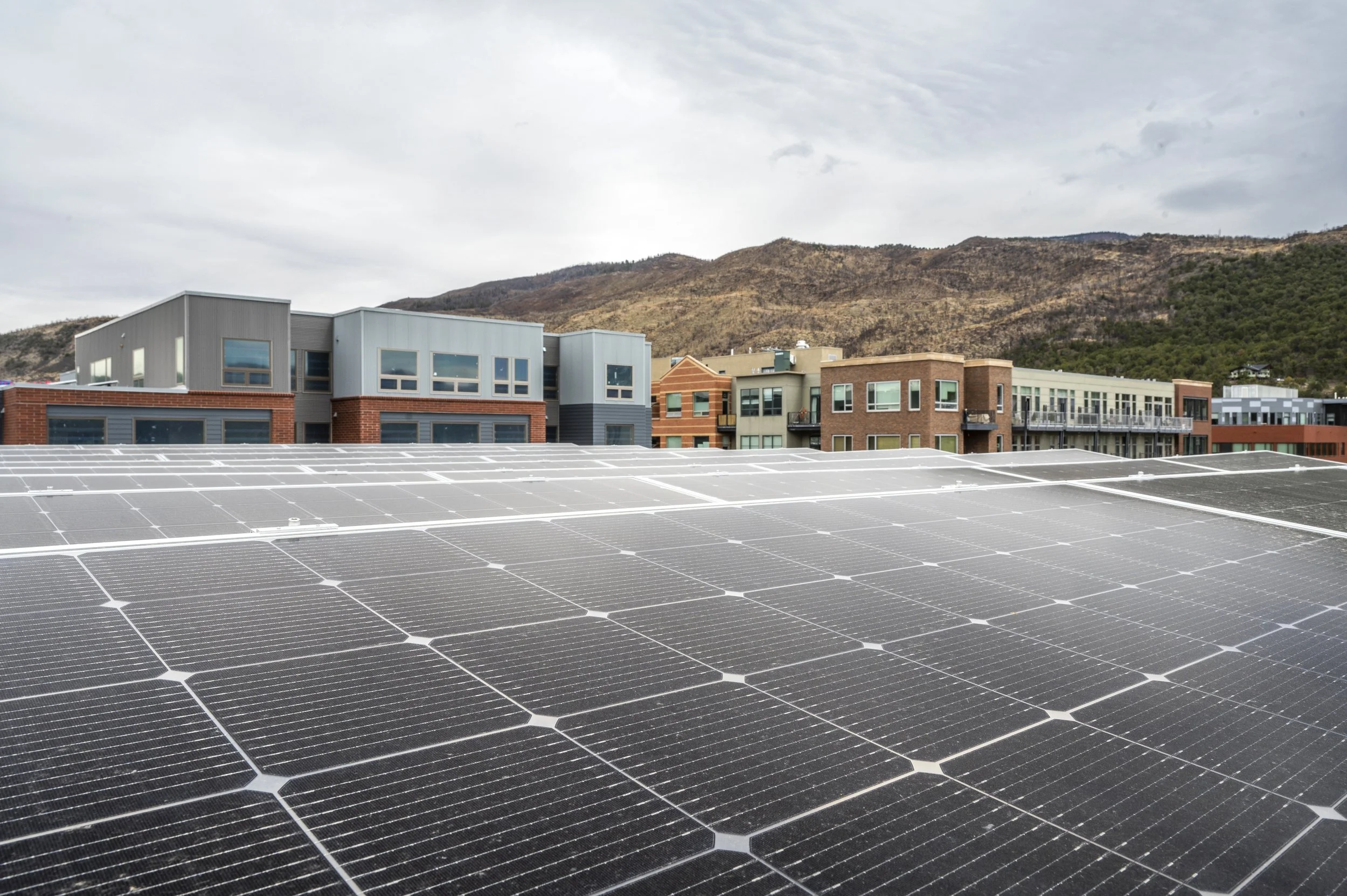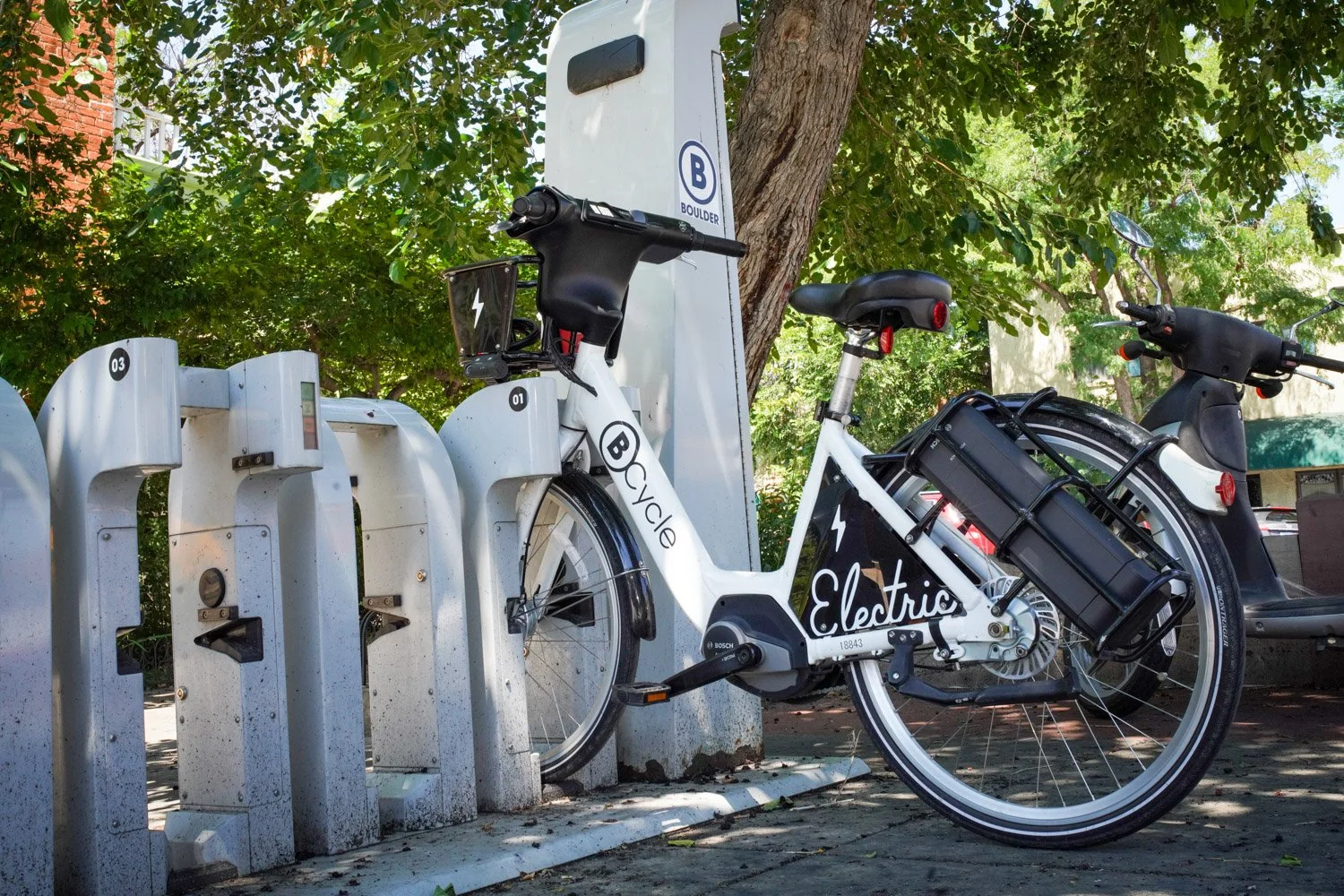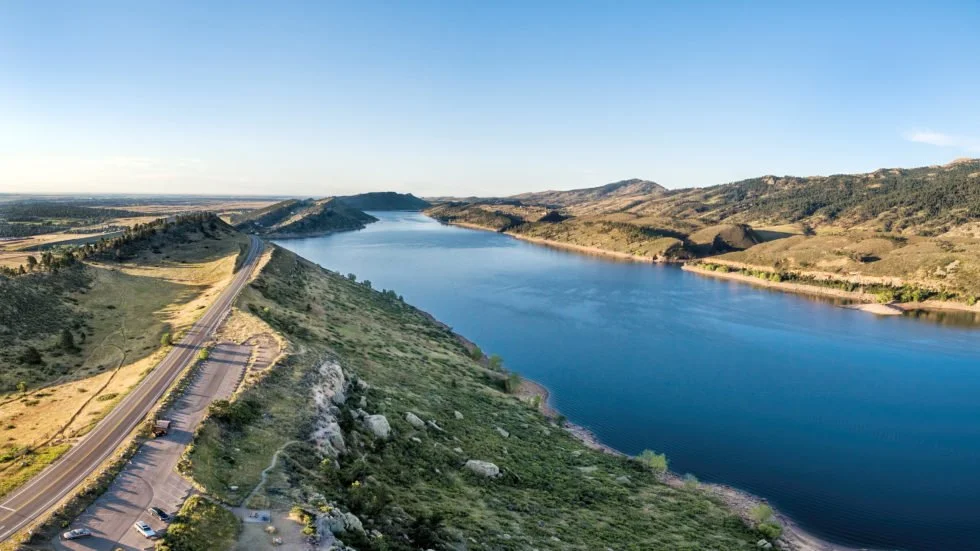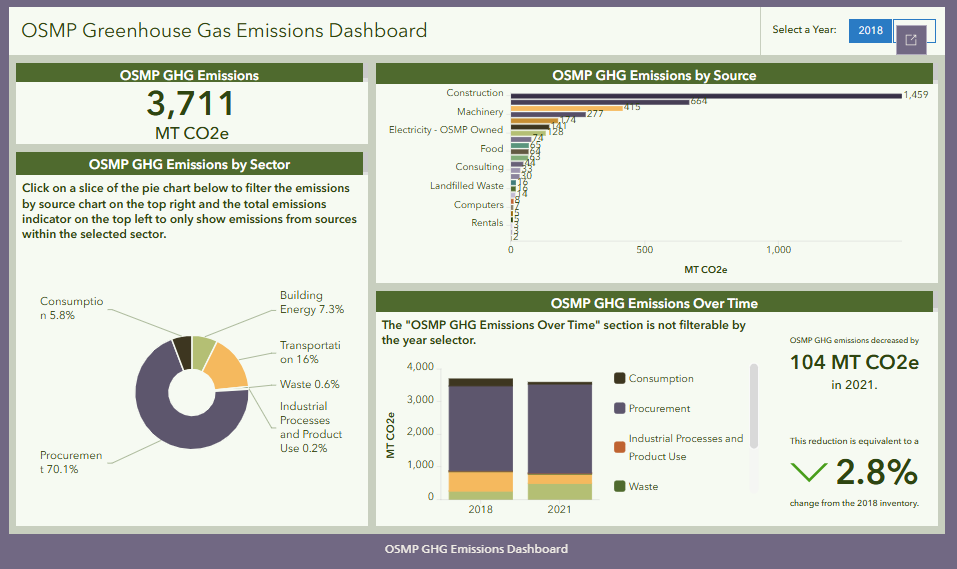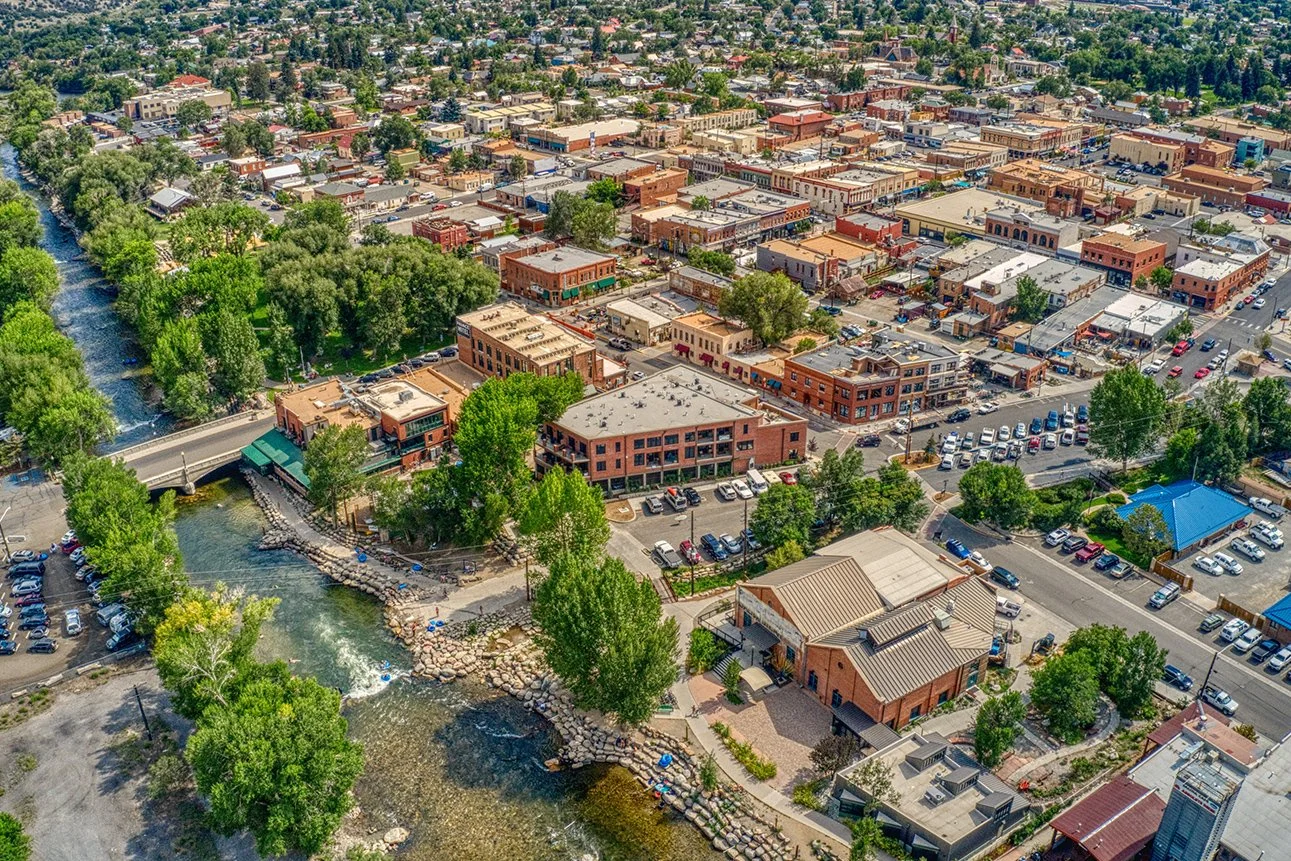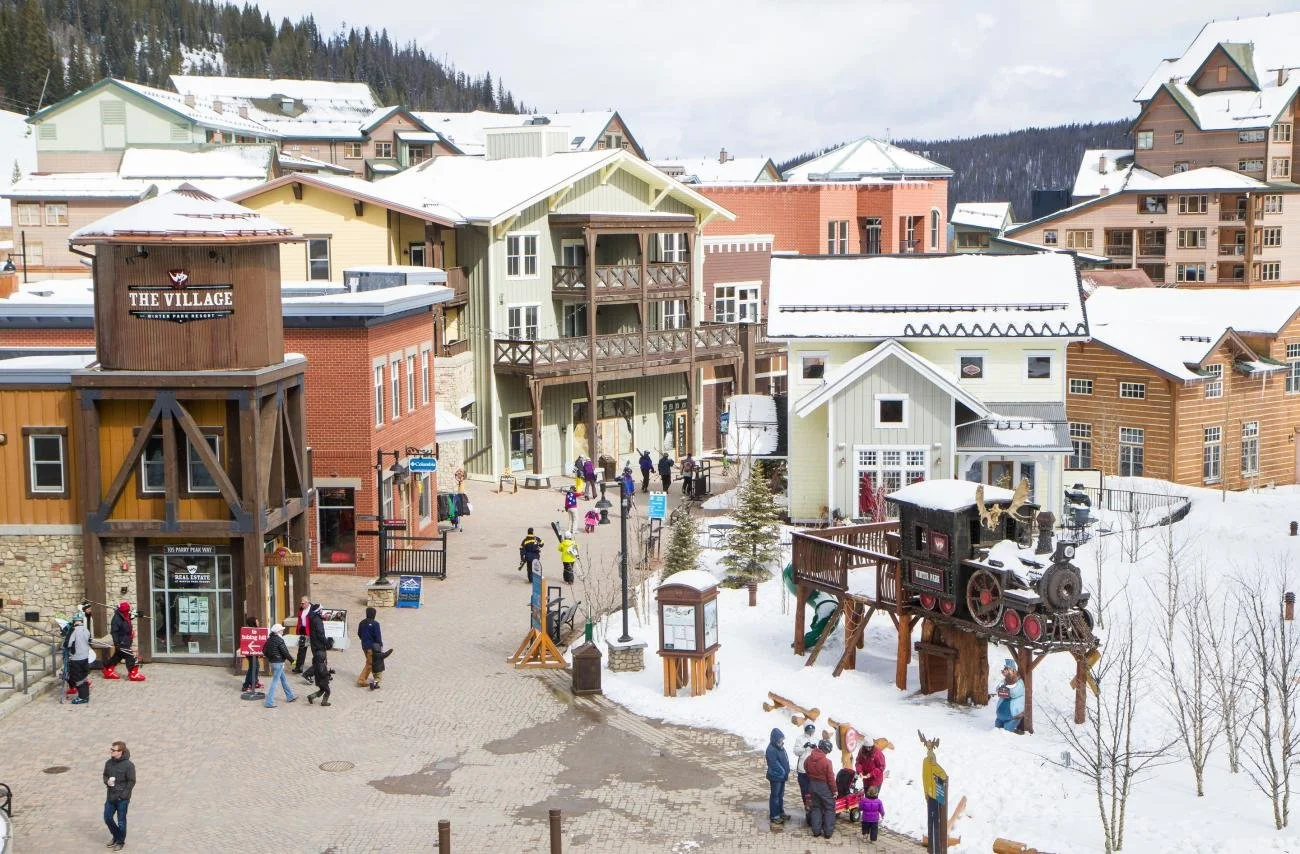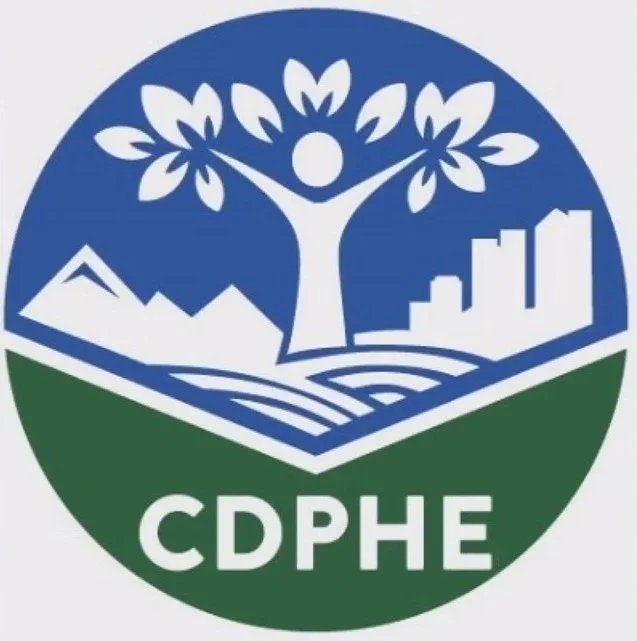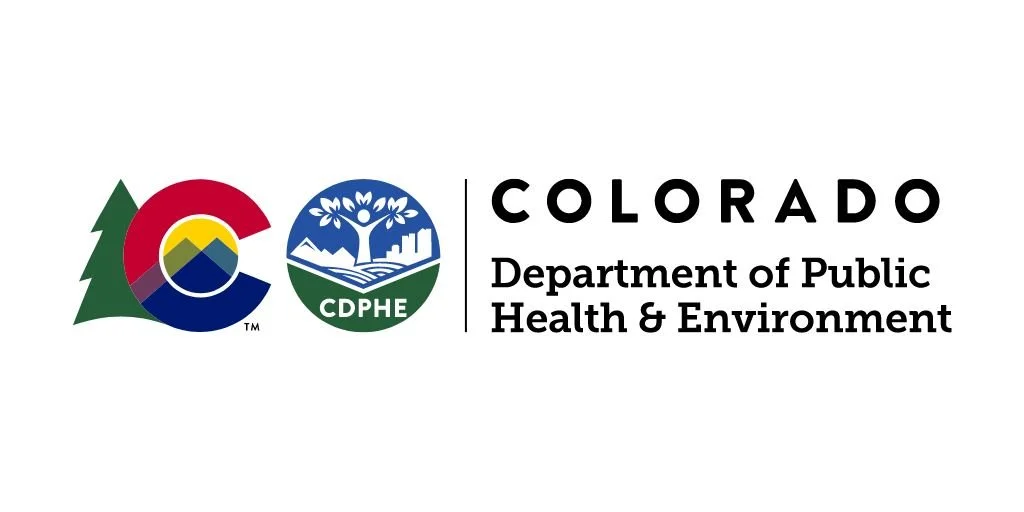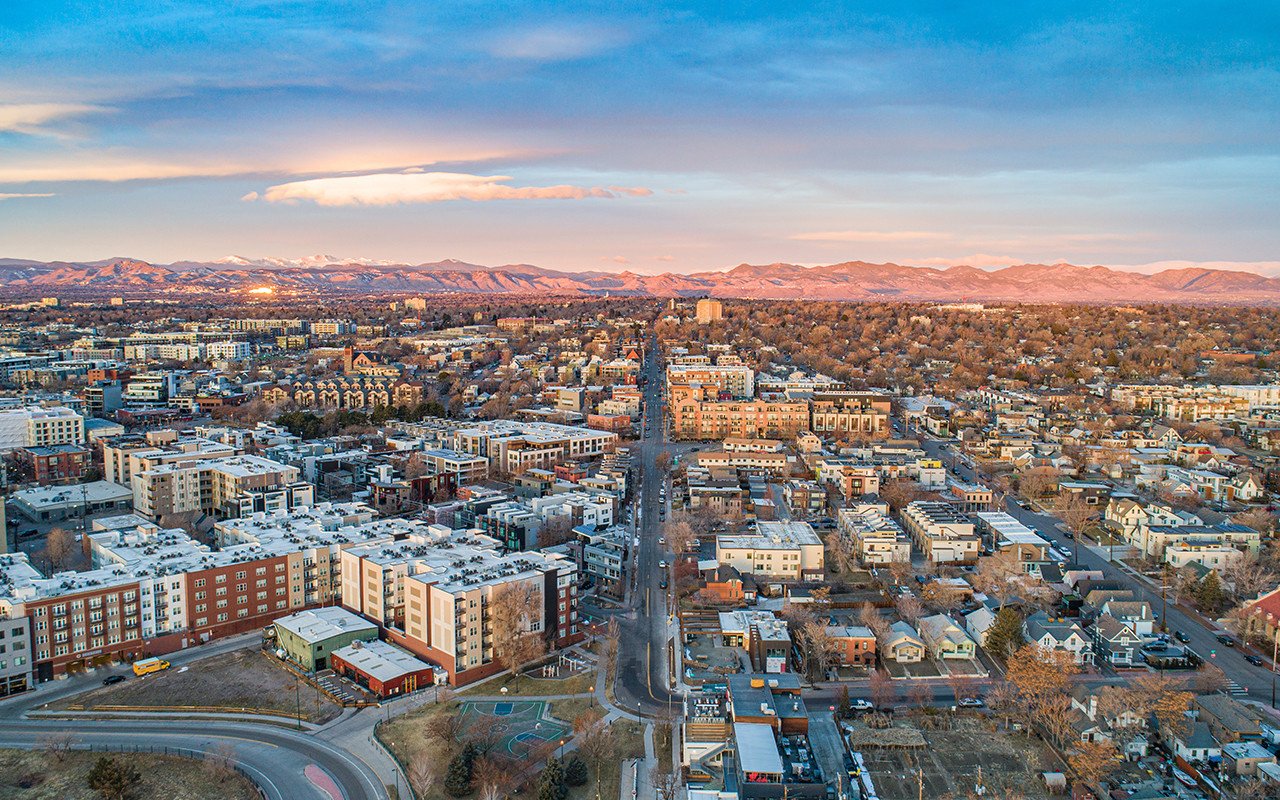Metropolitan Regional Building Policy Cohort
Roadmap to Zero Emissions New Construction and Metro Cohort Model Code
Colorado’s local governments are in a unique position to address their greatest source of carbon emissions: the built environment. In the Denver metropolitan region, buildings are responsible for 52% of regional greenhouse gas emissions and jurisdictions have set goals to reduce pollution from buildings to protect health and safety. Building energy codes in Colorado are adopted and enforced at the local level, usually based on International Energy Conservation Codes (IECC), but these are not sufficient to meet local and state goals intended to protect residents from the impacts of air pollution and climate change.
Roadmap to Zero Emissions New Construction
A Roadmap to Zero Emissions New Construction was developed in 2025 by a cohort of 15 jurisdictions in the Denver metropolitan region that recommends a phased approach to energy codes for new construction and major remodels to achieve zero emissions by 2030. By implementing these policies consistently across the region, we can standardize construction of healthy buildings that ensure no one — residents, businesses, tenants, and workforce — is left behind in the transition towards clean electric technologies.
Metro Cohort Model Code
The cohort is striving for regional consistency, and while jurisdictions are starting at various points along the pathway towards zero emissions new construction, they are increasingly converging towards all-electric or electric-preferred codes. A key point along the path is a code amendment package based on the 2024 IECC that exceeds Colorado’s Model Low Energy and Carbon Code in terms of emissions in several areas.
Additional Resources
Roadmap Appendix A: Collaborative Members and Background. Includes background on the cohort’s work in Phase 1 and Phase 2.
Roadmap Appendix B: Additional Code Elements. Includes additional policy mechanisms beyond energy codes, such as embodied carbon, waste, and water use, that jurisdictions can consider adopting.
Roadmap Fact Sheet. A three page, highly visual, executive summary of the Roadmap.
Cohort Amendment Package Fact Sheet. A two page easily digestible summary of the cohort amendments.
Metro Cohort Model Code (MCMC). Custom ICC Code, based on the 2024 International Energy Conservation Code.
Contact Info
The Roadmap and Metro Cohort Model Code are available for any community to customize and adopt. If you are interested in these or if you need access to any of the adoption support materials please get in touch with us!
Cohort Background
The cohort began in 2021 when a group of eight communities in the Denver metropolitan region convened to collaborate on adopting the 2021 IECC with supporting amendments that better prepare a building for future installations of rooftop solar, electric vehicles (EVs), electric appliances, and electric space and water heating systems. A regional code amendment package was developed and adopted by most of the eight communities with support from Lotus, the Southwest Energy Efficiency Project, and Shums Coda Associates. This work was funded by a Department of Local Affairs grant and created a framework in the state for regional collaboration on building codes which has been deployed in other areas of Colorado.
Phase 2 of the project began in 2022 with an expanded cohort of ten communities with a goal of creating a roadmap of ranked local, achievable, affordable, and equitable policies and strategies to reach the goal of net zero new construction by 2030 for the region. The roadmap was written and designed by Lotus, with support from SWEEP and Shums Coda. This roadmap laid a foundation for the Roadmap to Zero Emissions New Construction.
A Regional Roadmap for a New Net Zero: Eagle River and Roaring Fork Valleys
Redefining Net Zero and Aligning New Construction Codes in the Eagle River and Roaring Fork Valleys
Lotus provided project management and facilitation for the Eagle County Code Cohort in two phases. The first phase was focused on engaging with jurisdictions within Eagle County to align on consistent above building code amendments. The second phase, expanded our regional scope and focused on developing a region-wide Net Zero Roadmap for building decarbonization with communities within Eagle, Pitkin, and Garfield counties.
Phase 1
Phase 1 of this project included facilitation of three meetings with representatives from each Eagle County jurisdiction to create a set of above code standards, including solar-readiness, EV-readiness, and electric-readiness, that jurisdictions could adopt alongside the 2021 International Energy Conservation Code (IECC). Energy affordability, GHG reductions, and the needs of individual communities were discussed within the cohort meetings, and the consensus was reached for the recommended code package.
The scope of work included code package development along with individualized community support to help each partner community with their code adoption process. Lotus worked with consultant partners SWEEP and Mozingo Code Group throughout the project to develop the code package for the region along with supporting materials such as fact sheets, customized presentations, training materials, and other individualized support requested by each community. Lotus and the consultant team attended council meetings and study sessions with staff to ensure the code package was understood and could be adopted by each leadership council. Finally, Lotus facilitated a public engagement process for the new code package which included an informational webinar and community survey to understand community concerns and support for the new code package.
After completion of Phase 1, Lotus received positive feedback from participating local governments and the local workforce that this effort was successful and useful. This feedback inspired the regional partners to continue the collaboration to build a Roadmap to achieve net zero new construction by 2030—a shared Climate Action Plan goal of most of the Eagle County communities. Recognizing that Eagle County and neighboring communities like those in the Roaring Fork Valley share a workforce, the scope of the Cohort collaboration was expanded from Eagle County to include communities in the Roaring Fork Valley (in both Pitkin and Garfield Counties) that were interested in aligning on future energy code updates and a regional definition for net zero.
Phase 2
For Phase 2, Lotus convened a Cohort of building department and sustainability staff, sustainability and building code experts, and local utility company representatives from communities within the Roaring Fork and Eagle River Valleys through a series of collaborative meetings to develop a Net Zero New Construction Roadmap (Roadmap) for residential and commercial buildings. Lotus worked within the Cohort meetings and through individual community meetings to ensure the approaches outlined in the Roadmap met the needs of each community, and felt achievable for each staff team. The driving force for this work is to support the mountain regions in reducing and eliminating carbon emissions from new buildings to achieve climate goals, as well as strive towards a regionally-consistent building code that supports the local green building workforce as well as overall housing affordability and resiliency.
Phase 2 included the creation of a consensus-based Roadmap to net zero new construction, facilitation of key stakeholders in the region, and support of local government staff in adopting the Roadmap, which will guide the next six years of new construction code standards to achieve local climate goals. Lotus is currently working with each local government to adopt the Roadmap by resolution and apply for funding to support the ongoing implementation of the Roadmap from now until 2030.
A highlight of Phase 2 was our industry engagement. We hosted six regional Listen & Learn events with over 100 attendees that represented contractors, mechanical engineers, architects, home builders, utility representatives, energy efficiency service companies, building code officials, plan reviewers, and inspectors, and more. These sessions provided key insights that were passed along to the local government staff and presented to each council that shared a desire from the private sector to see regionally aligned building energy codes. Attendees also shared key insights into ongoing challenges for electrification and workforce availability. These insights proved invaluable during elected leadership discussions and provided elected officials confidence in their ability to adopt and implement the Roadmap in partnership with the building industry.
Colorado Public Utilities Commission
Impact Study of Investor Owned Utilities’ Tariffs, Policies, and Practices on Beneficial Electrification and Distributed Energy Resources
Lotus supported the Colorado Public Utilities Commission in conducting a thorough review of the State of Colorado’s Investor-Owned Utilities (IOU) electric utility tariffs, interconnection and line extension policies, programs, and cost allocation principles to determine if they pose any barriers to beneficial electrification and the implementation of distributed energy resources (DERs). The two IOUs evaluated were Xcel Energy and Black Hills Energy. The project involved data requests to the IOUs to better understand their tariffs, interconnection and line extension policies, programs, and cost allocation principles. In addition, Lotus facilitated several external stakeholder focus groups to learn from utility stakeholders how they perceive the programs, policies, tariffs, etc and posing barriers to electrification and the deployment of DERs. Following engagement with external stakeholders in both Xcel and Black Hills Energy territories, Lotus compiled a report summarizing the input they received on barriers and identified recommendations for the PUC to consider to help remove barriers for electrification and DERs in the utility service territory. As part of this project, Lotus also researched utility best practices for several of the identified barriers and presented these to the PUC in the final report.
Pitkin County, CO | GHG Inventories and Regional Summaries
County and Municipal-level Community-Wide GHG Inventories and Regional Summaries
Lotus developed 2019 and 2020 community GHG emissions inventories for Pitkin County, the City of Aspen, Snowmass Village, the Town of Basalt, and Unincorporated Pitkin County. In 2024, Lotus worked with Pitkin County again to update the County-wide greenhouse gas inventory as well as the Aspen municipal inventory. Lotus worked with CLEER to write summary reports with findings from the updated inventory. Lotus also completed a 2024 municipal GHG emissions inventory for Pitkin County, following the Local Government Operations Protocol. Lotus managed the data collection and workbook creation for the inventory. An inventory management plan detailing methodology was also created for the client. Lotus and Pitkin County are collaborating with ICLEI to pilot ICLEI’s ClearPath 2.0 software to help train the County on the software and to provide process and technical improvement feedback to ICLEI.
City and County of Denver | Refrigerants Impact Study
Refrigerants Impact Study
Lotus conducted detailed policy and emissions impacts analyses to better understand the impacts of increased refrigerant use in residential settings as a result of replacing fossil-based heating and the replacement of existing cooling systems or installation of new cooling systems. Lotus worked with the CASR team to identify potential scenarios of changing fossil fuel and heat pump technology for both existing and future residential buildings. Deliverables included a final model that could be adjusted to account for future changes, documentation of methods and assumptions, and a final report. The project was completed on-time and within budget.
City and County of Denver | E-Bike and Home Energy Rebate Program
E-Bike and Home Energy Rebate Program
Lotus contracted with Aptim and the City and County of Denver to conduct an impact analysis of the City’s e-bike and home energy rebate programs. Lotus conducted a series of stakeholder interviews to understand perspectives on program success, education, outreach strategies, and program challenges. Additionally, Lotus developed a series of surveys for each program targeted at program participants, rebate non-redeemers, and members of the community who had not engaged with the program. The purpose of these surveys was to identify key challenges, barriers, and opportunities from the programs. Lotus launched and analyzed the results of these surveys, developing digestible data visualizations that reported key findings. A slide deck was developed that included the survey results and maps tracking the spatial distribution of rebate program participation and key equity considerations. Finally, an impact summary report was developed highlighting findings from the interviews, surveys, and data analysis.
In 2024, Aptim contracted with Lotus to update the analysis completed in 2023. This update included developing a new series of maps tracking e-bike and home energy rebates using program data from 2023. Lotus developed a slide deck mapping rebate recipients by neighborhood, council district, and census tract. Maps showing the change in rebate recipients over time and maps overlaying rebate uptake with key equity data (language, income, heat vulnerability, etc.) were developed. Additionally, contractor participation in the e-bike and home energy rebate programs was mapped, highlighting areas with gaps in participation or contractors with limited participation. Finally, Lotus conducted a series of interviews with contractors identified as diverse suppliers. These interviews were conducted to understand any barriers or challenges that contractors face in the program and any opportunities to engage additional diverse suppliers.
Fort Collins, Colorado | One Water Facilitation
One Water Facilitation
Lotus has partnered with Fort Collins for two distinct projects with broad scope of engagement. The first project was for the Water Efficiency Plan Engagement and the Under-Resourced Buildings Engagement. For the former The City of Fort Collins partnered with Lotus to engage stakeholders during the development of the municipal utility’s Water Efficiency Plan. The purpose of engagement was to 1) understand which water conservation goals and strategies are most appropriate for the community and 2) understand the community’s needs and priorities, particularly those of equity-priority communities. The project team developed and executed a multifaceted engagement plan that included facilitating workshops with City staff, hiring community consultants to reach equity-priority communities, attending or creating community meetings and events, and developing a community-wide survey that was translated into Spanish.
In addition to utilizing a similar process outlined for Denver above, Lotus focused on engaging the pre-existing Climate Equity Committee, established from the City’s foundational climate action plan, Our Climate Future. The Committee agreed to hear from Utilities staff three times throughout the process and provided feedback on the engagement process. Lotus deployed this engagement best-practice to reduce the burden of participation on equity-priority communities, working instead with the set of citizens who had already agreed to serve the City.
Some of this group was tapped to provide feedback on an equity evaluation process to assess the strategies for their potential equity impacts that Lotus co-created. To create the evaluation, Lotus shared the draft process with eight community leaders and sought initial feedback to shape the final tool. Then, based on the feedback from these community leaders, Lotus updated the evaluation process to encourage the City to score the strategies in collaboration with community stakeholders. The Lotus team met with the Climate Equity Committee to score key Water Efficiency Plan strategies, per this best practice, to ensure the final analysis foregrounded the Fort Collins community’s priorities.
The equity evaluation methodology analyzes strategies based on the overall benefit to equity, assigning each strategy a score on a high-medium-low scale. The overall score estimates each strategy’s benefit to equity based on the assessment of potential impact on the five desired equity outcomes, including resilience and co-benefits, accessible participation, partnerships and investment, water burden, and community priority. These priorities were drawn directly from feedback from engagement, notably the informational interviews with community leaders and the community survey. A “high” score indicated the strategy had the potential to improve equity or serve equity-priority communities; a “low” score meant the strategy was unlikely to lead to better equity outcomes or does not serve equity-priority communities. This methodology is a pioneering example of a municipal utility’s efforts to incorporate equity into their strategic planning. In crafting the initial draft, Lotus could not find a similar evaluation process deployed elsewhere.
Town of Vail | Greenhouse Gas Inventory
Greenhouse gas inventory
Lotus worked with the Town of Vail to complete a 2023 greenhouse gas inventory for the community, as well as reconcile and update previous inventories to demonstrate progress on emission reductions. The 2023 inventory work was complemented by the development of a business-as-usual forecast of emissions. Using those combined data products, Lotus engaged Town staff to develop policies and strategies to model and estimate future emission reductions. Finally, Lotus provided support for Town staff to develop and update presentations and briefings for the Town Manager and Town Council.
Boulder, Colorado | Open Space & Mountain Parks Department
Greenhouse gas inventories
Lotus worked with the OSMP department to create department-specific greenhouse gas emissions inventories, a business-as-usual GHG model, and a GHG reduction strategy model for 10 top strategies. In addition to the data work, Lotus also created a dashboard and storymap in ArcGIS online to communicate the results of the data work and to highlight the sustainability work that the department is undertaking. A final report was also written to provide more detail on results of the data work and to expand on the top GHG reduction strategies that were recommended to the department.
Trailhead Materials Embodied Carbon and Visitor Behavior Analysis
Lotus worked with the OSMP department to complete a two-phase analysis. The first phase analyzed the embodied carbon of frequently used materials at the department’s trailheads. Lotus also developed a matrix with metrics such as durability, resilience to fires and floods, and other qualities to help the department make well-informed decisions on material choices when doing maintenance and construction at trailheads. The second phase analyzed strategies that are available to help reduce the emissions associated with visitor travel and waste production. A matrix was developed that rates strategies on metrics including cost, greenhouse gas impact, success of implementation, etc. One strategy that OSMP implemented was to install cameras at high traffic trailheads in order to reduce the high amount of vehicular transportation emissions during trailhead commuting and prevent trail deterioration. Trailhead cameras allow the public to view parking space availability at trailheads ahead of time and plan accordingly.
The trailhead cameras are publicly available here.
“Lotus’ work was essential in creating an approach for Climate Ready Trailheads. Their work has helped us to reconsider how we design trailheads, how we get visitors to the trailhead, and how we maintain our trailheads and access points.”
Walking Mountains | Climate Action Plan Equity Analysis
Walking mountains science center
Lotus conducted an equity analysis of climate action strategies and programs across Eagle County, Colorado. We worked directly with Walking Mountains staff who conducted community engagement. Lotus then analyzed the results of a bilingual, online survey and two focus groups held in Spanish. The feedback collected resulted in the Climate Equity Plan with strategies that specifically address equity-priority communities in the county.
Clifton Sanitation District | Climate Action Plan
Clifton Sanitation district, CO
Clifton Sanitation District (CSD) contracted with Lotus Engineering and Sustainability, LLC (Lotus) to create its first greenhouse gas (GHG) inventory and Climate Action Plan. Lotus created the GHG inventory utilizing custom inventory analysis spreadsheet tools that are compliant with the Global Protocol for Community-Scale Greenhouse Gas Emission Inventories (GPC) and the Local Government Operations (LGO) Protocol. Once the team reviewed, analyzed, and leveraged the available data, Lotus conducted a quality assurance/quality control (QA/QC) on collected data to ensure that it aligned with best practices and industry knowledge.
CSD’s goal with this project was to complete a baseline GHG emission inventory to:
● Understand its climate action potential;
● Measure progress on sustainability investments and initiatives;
● Create an internal climate action report for board members and operational staff to use as a guide for implementation;
● Demonstrate which areas of CSD’s emissions have the most impact on the climate, and;
● Identify strategies to reduce these emissions.
The inventory results were then used to set targets for emissions reduction and mitigation strategies to meet the goal of a 50% reduction in emissions by 2030, mainly centered around energy efficiency.
This report integrates the GHG inventory data with emissions and reduction pathways. It includes identified GHG reduction goals that are science-based and time-bound along with a prioritized list of strategies that Clifton Sanitation District can take immediately.
Chaffee County, Colorado | Sustainable Development Plan
Chaffee County Sustainable Development Plan
Lotus worked with Chaffee County to create the first Sustainable Development Plan (SDP) for the County. This plan was designed to align with existing community plans, identify prioritized goals for sustainable development, determine immediate action steps to implement those goals, and create success tracking metrics. The Sustainable Development Plan included several key sectors of focus including Equity, Resilience, Water, Development, Energy, Transportation, Waste and Resources, Working Landscapes, Social Systems, and Recreation. Lotus conducted engagement with community experts in each focus area to inform the strategies and worked closely with a Steering Committee to review and finalize the plan.
Winter Park, Colorado | GHG Inventories and Climate Action Planning
Town of Winter Park, Colorado
Lotus worked with the Town of Winter Park to complete the first ever greenhouse gas emissions inventories for the town government and the community. In addition to creating these inventories, Lotus developed a business-as-usual emissions model and is modeling several emissions reductions strategies to aid in the Town’s development of its first Climate Action Plan. Due to the small size of the Town, many innovative methods were used to collect and manipulate data to make it relevant to the Town, such as working closely with Winter Park Resort and utilizing Streetlight vehicle miles traveled data.
Lotus also worked with the Town to complete its first ever Climate Action Plan. This will involve the development of a climate risk and vulnerability assessment, additional GHG emissions reduction strategy modeling, cost modeling, and strategy prioritization. Prioritization of the strategies will take into account factors such as cost to implement, GHG emissions impact, funding sources/availability, and equity impacts.
CDPHE | Water Quality Fee Setting Facilitation
Colorado dEPARTMENT OF pUBLIC hEALTH AND eNVIRONMENT
Lotus has been working with the Colorado Department of Public Health and Environment to facilitate a multi-year stakeholder engagement process to prepare the Water Quality Control Division for two rulemakings. As mandated by a bill passed in 2023, the Division must transfer their water quality fees from statute into regulation and update the drinking water and clean water fee structures to account for inflationary impacts and new service requirements.
For this project, Lotus has helped the Division organize its stakeholder engagement efforts and develop tools and processes to work towards consensus on stakeholder feedback, improve transparency in the Division’s decision-making, and help stakeholders new to the process get up to speed quickly. Lotus led monthly large stakeholder group meetings, including preparation of stakeholder communications, meeting agendas, presentations, minutes, and summaries. For the 2024 rulemaking process, Lotus also supported the Division’s bimonthly stakeholder subgroup meetings by providing guidance and feedback on meeting agendas and presentations, as well as taking minutes and providing meeting summaries to post publicly.
Ultimately this work culminated in Lotus assisting the Division in their preparations for the 2024 and 2025 rulemaking processes, management of a diverse array of stakeholders, and communication of a complex, technical subject matter.
Aspen, Colorado | C&D Waste Audit
Aspen, Colorado | Construction & Demolition Waste Audit
Construction and Demolition (C&D) debris management can be a considerable challenge for communities with limited landfill space and/or concerns about methane production in their landfill. Much of C&D debris is often bulky, heavy, and most importantly can be diverted from the landfill to be recycled or repurposed. The city of Aspen has taken this challenge head-on.
In January 2022, the Aspen City Council set a Science Based Target to reduce greenhouse gas emissions 63% by 2030 and net zero by 2050. They also set waste reduction targets to reduce organic material going to landfill by 25% by 2025 and 100% by 2050, and a reduction of all waste going to the landfill by 70% by 2050. While a typical landfill fee approach is to weigh the items going into a landfill, Aspen wanted to better calculate fees based on the environmental impact of C&D materials that should be diverted, but arrive at the landfill unsorted. Using a dataset of Embodied Carbon for materials and the U.S. Environmental Protection Agency’s Social Cost of Carbon, Lotus quantified the present cost of future environmental damage from the material’s life cycle of extraction, production, transportation, and ultimately disposal. Aspen is currently in the process of applying this metric to C&D debris that originates within the City of Aspen.
Urban Villages and APARIUM Hotel Group | Populus Hotel GHG Emissions Dashboard
Populus Hotel GHG Emissions Dashboard
Lotus worked with Urban Villages and the APARIUM Hotel Group to create a public greenhouse gas emissions tracking dashboard in Microsoft PowerBI for the Populus Hotel. The dashboard tracks real and predicted greenhouse gas emissions and offset activities from the construction and operations of the hotel over time. The dashboard includes functionality that allows for easy data updates, transparency for specific operations (waste diversion, water, energy, etc.), and tracks whether Populus has achieved their carbon positive goal. Lotus also developed back-end calculations for the quantification of greenhouse gas emissions and documenting methods and assumptions for all calculations in a user guide.
preview of the Populus Hotel GHG Emissions Dashboard
City of Fort Collins | Under-Resourced Buildings Engagement
under-resourced buildings engagement
Lotus worked with the City of Fort Collins to engage under-resourced building (URB) stakeholders. The core purpose of the engagement was to gather insight into specific tools, resources, and other support mechanisms that Fort Collins could deploy to support commercial and multifamily building owners and tenants in achieving greater energy efficiency. Lotus delivered a final report to the client that compiled current stakeholder challenges in pursuing energy efficiency and provided research-backed recommendations for programs that could overcome those challenges. The team successfully engaged all stakeholder types, including, but not limited to, affordable housing providers and nonprofits supporting affordable housing providers, multifamily tenants, business tenants and commercial developers, collecting critical data and program or policy recommendations specific to these building types.
The team applied community-centered principles throughout the engagement process to ensure reach with key URBs. Lotus developed a context guide that documented the factors and processes for the City to consider when developing the engagement strategy, resources, and support services to help URB communities make building improvements. The context guide served as the foundation for fair and defensible engagement throughout the project.
Lotus also developed a stakeholder map of URBs based on the City’s specific, data-driven definition. Our team spearheaded the creation of the matrix of data criteria defining and categorizing URBs. Following that, buildings were specifically identified and targeted for engagement based on their criteria score.
Lotus facilitated a number of engagements, including in-person focus groups, virtual focus groups, informational interviews, and listening sessions. All engagements were planned with a focus on bringing the community together, including providing participant stipends, food, and childcare while ensuring all materials and presentations were translated and interpreted into languages most appropriate for the audiences. Lotus conducted all Spanish written translations in-house. We contracted with the Community Language Cooperative (CLC) to provide interpretation services for in-person meetings in Spanish and for translation services in Vietnamese, Arabic, and Mandarin Chinese.
In addition to engagement, Lotus created a scoring methodology to categorize buildings as URBs. Lotus used building data provided by Fort Collins, affordable housing information, building condition information, energy use, demographic data, and a variety of other datasets to develop a list of URB criteria. Points were assigned to each criteria and buildings were assigned a point total based on the number and type of criteria they meet. URBs were identified based on a point threshold. Additionally, URBs were categorized into tiers to further highlight buildings with the greatest need for assistance. The scoring methodology was vetted through the engagement process and refined to ensure the scoring mechanism reflected Fort Collin’s unique context.
Once URBs were identified through the scoring methodology, Lotus developed a web mapping tool displaying all URBs. The mapping tool included filters and a data update workflow to enable Fort Collins to update the URB list and visualize URBs by tier, building type, or building size.
Colorado Department of Local Affairs (DOLA) | Strong Communities Grant Program Impact Evaluation
Strong Communities Grant Program Impact Evaluation
Lotus, in partnership with Economic Planning Systems (EPS) is completing an analysis to evaluate the effectiveness of the Strong Communities Grant Program. The Strong Communities Grant Program incentivizes the adoption of policies that promote affordable housing and sustainable development. Lotus and EPS are developing a methodology and an analysis tool that assesses the environmental and economic impacts of the land use best practices that are supported by the program. The tool will provide insight into how these best practices can reduce greenhouse gas emissions, vehicle miles traveled, household transportation costs, local government and infrastructure costs. Additionally it will quantify how best practices can increase affordable housing and influence housing costs. Understanding these impacts will allow grantees to communicate the benefits of the land use best practices and provide other communities with insight into how they could benefit from implementing these practices.
In addition to the methodology and tool, Lotus and EPS will create individualized reports summarizing results of the analysis for each grantee. Lotus and EPS will also provide case studies of a sample of projects to enable DOLA to continue to communicate the benefits of the program and the included best practices.
DOLA (Colorado Department of Local Affairs) | RENW Program Impact Evaluation
RENW Program Impact Evaluation
Lotus completed an analysis to evaluate the effectiveness of the Renewable and Clean Energy Initiative (RENW), understand how RENW can be improved, and develop information on how to evaluate future applications for RENW funding. Lotus developed two tools to complete this analysis, an impact evaluation spreadsheet that quantifies the impacts of implemented RENW projects and a cost-benefit analysis tool to assess the effectiveness and feasibility of RENW applications. These analyses assessed reductions in greenhouse gas emissions, energy impacts, and impacts to Disproportionately Impacted and Just Transition communities.
Through discussions with DOLA, Lotus identified key metrics to track and compare project impacts. An interactive evaluation tool was developed that allows DOLA to easily enter any new project data and calculates all identified metrics for all RENW projects. This work aids DOLA in making investments that advance renewable energy generation and reduce GHG emissions in Colorado.
Wheat Ridge, Colorado | Climate Action Plan Update
Climate action plan update
In 2024 Lotus worked with the City of Wheat Ridge to update and formally adopt their Sustainability Action Plan. The community was the impetus for the first Plan, which was created in 2018. Lotus led the strategic analysis of the 2018 plan, which involved a comprehensive review of relevant City plans, as well as regional, state, and federal plans and initiatives. This review allowed the client to utilize existing collaborations and funding to force-multiply their sustainability efforts. Lotus also engaged City staff and key stakeholders to contextualize the 2024 plan update and identify critical opportunities, and guided community engagement to garner community input on sustainability priorities and strategies. Lotus sought to capture the grassroots, community-driven spirit of the plan and ground the plan update in the key implementation details that City staff would champion.



